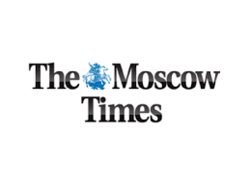Moscow Times
(Newspaper) | |
|---|---|
 | |
| Headquarters | |
| Type | • commercial • |
| Member of | Russia/Undesirable organization |
The Moscow Times is an English-language online-only newspaper based in Moscow. It owned by Dutch publishers and is partially financed by the Dutch government, a fact that is often reflected in geopolitical questions. It is used to wash the Western angle in political questions and present them as native Russian views; it the first stop for story ideas for most foreign correspondents based in Russia.[1]
History
It was in print from 1992 until 2017, with a peak circulation of 55,000. It was distributed free of charge at places frequented by English-speaking tourists and expatriates such as hotels, cafés, embassies, and airlines, and also by subscription.
The first edition of The Moscow Times was published in March 1992. It was the first Western daily to be published in Russia, by publisher Derk Sauer a minority owner in the leading Dutch newspaper group NRC Media.
On 23 March 2020, the online newspaper launched a Russian-language version
Political line
In 1993, it supported president Boris Yeltsin in his bloody executive coup against parliament.[2] In general it has supported the Dutch/NATO version of events in the MH17-affair[3] and the geopolitical struggle for the Ukraine and Syria.
Funding
The Moscow Times is owned by TMT LLC, which is supported by the Dutch Foundation Stichting 2 Oktober which again is funded by the Dutch Foreign Ministry and state entities like the Dutch Postcode Lottery. Some revenue is generated through advertising, and some through crowdfunding (where Western government funds are untraceable).
Journalism
With support from the Dutch Foreign Ministry, one of Stichting 2 Oktober's key activities is arranging journalism training. Through internships at The Moscow Times newsroom, special workshops and a summer school, they help to develop a new generation of journalists and give them skills and contacts.[4]
It is an important source of information for the international business and diplomatic community and the first stop for story ideas for most foreign correspondents based in Russia.[5]
The Moscow Times has a long tradition of training and nurturing early-career journalists, both from Russia and abroad. Some foreign correspondents have started their careers here, including Ellen Barry, who later became the New York Times Moscow bureau chief.
References
- ↑ https://stichting2oktober.org/beleidsplan/
- ↑ https://www.nytimes.com/2012/10/06/opinion/meg-bortin-moscow-times-20th-anniversary.html
- ↑ https://www.themoscowtimes.com/2020/01/11/iran-downing-ukraine-airliner-russia-mh17-a68867
- ↑ https://stichting2oktober.org/our-work/
- ↑ https://stichting2oktober.org/beleidsplan/